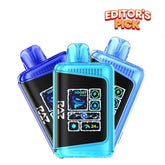FDA Poised to Ban E-Liquid Flavors Nationwide; Claims Underage Vaping is an "Epidemic"

Errick Perry, Jordan Premonics, Karina White, and Chris Stansell contributed to this report.
FDA Poised to Ban E-Liquid Flavors Nationwide; Claims Underage Vaping is an "Epidemic"
If the five plans submitted by these companies are not considered by the FDA to “appropriately address this issue," the agency will consider demanding immediate premarket reviews for existing vapor products (instead of in 2022), and implement a ban on all E-Liquid flavors nationwide.
“We know that the flavors play an important role in driving the youth appeal. And in view of the trends underway, we must take steps to curtail the marketing and selling of flavored products,” Scott Goettlieb ,M.D., Commissioner of the FDA said Wednesday.
The FDA attempted to ban flavors in 2016, but this new announcement marks the most aggressive and fretful attempt to challenge the success of the vaping industry “in FDA history.” The underage vaping “epidemic”, according to the FDA, requires dramatic action.
The disregard of nearly 250,000 comments sent to the FDA this year which supported the access to E-Liquid flavors clearly expresses the gravity and redirection of the FDA’s threat. The fight for E-Liquid flavors is no longer about adults.
“We won’t allow the current trends in youth access and use to continue,” said Goettlieb, “even if it means putting limits in place that reduce adult uptake of these products… The FDA won’t tolerate a whole generation of young people becoming addicted to nicotine as a tradeoff for enabling adults to have unfettered access to these same products.”
Numerous cities in the United States have already banned E-Liquid flavors, including San Francisco, CA, with states such as New York considering implementing the same policies statewide.
The Rates of Teen Vaping
The rates of teen vaping seem to be the central focus of the aggressive regulations from the FDA. FDA Commissioner Dr. Gottlieb said in a speech at the agency’s headquarters, “We’re committed to the comprehensive approach to address addiction to nicotine that we announced last year. But at the same time, we see clear signs that youth use of electronic cigarettes has reached an epidemic proportion, and we must adjust certain aspects of our comprehensive strategy to stem this clear and present danger.”
The CDC reports otherwise. A study by the CDC posits that youth e-cigarette and vaping usage has been in decline since 2015, dropping from 16% in 2015 (page 6) to 11.7% in 2017. Other tobacco products were found to be used by 25.6% of high school students. The study does not state whether teens who used e-cigarettes or vaped ingested nicotine in any way.
Some argue that the logic of banning vape flavors to deter teenage usage is counterintuitive. Jim McDonald, a reporter for Vaping360, argues that teens will continue to engage in adult activities because that's what they do. According to McDonald, “The entire period of adolescence is a rehearsal for adulthood: teens practice being adults by experimenting, trying adult things, and making adult decisions.”
The Money
Along with the other data and information cited by the FDA as their reasoning for this announcement, one aspect of this proposed ban in particular sends up red flags.
According to the Wednesday announcement, the FDA is giving e-cigarette retailers 60 days to come up with their plans to prevent underage usage of their products. The FDA is looking at five companies: Vuse, Blu, JUUL, MarkTen XL, and Logic.
These companies comprise 97% of the U.S. market for E-Cigarettes, but it should be noted that most of these companies are actually owned by Big Tobacco Corporations. These same Big Tobacco Corporations saw a sizable spike in their stock prices following the Wednesday announcement by the FDA.

Vuse is owned by Reynolds American which is a subsidiary of British American Tobacco, the largest publicly traded tobacco company in the world. In 2015, Vuse was the best selling e-cigarettes device across gas stations and convenience stores in America, but now they only account for 9.6% of the U.S. e-cigarette market compared to JUUL’s 72.1% market share.
Blu e-cigs was originally purchased from its founder by the Lorillard Tobacco Company, who was then in turn purchased by R. J. Reynolds Tobacco Company, a subsidiary of British American Tobacco. Since British American Tobacco already owned Vuse at the time, they decided it was more prudent to sell the company rather than its products and sold Blu to Imperial Brands. Imperial Brands is another British-owned multinational tobacco company and produces Davidoff, West, Gaulosies Blondes, and Montecristo cigarettes.
JUUL is the only company on this list provided by the FDA which is still independently owned. JUUL was originally launched in 2015 by PAX Labs, an alternative vape device manufacturer. The JUUL was spun off from PAX and became its own independent company in 2017 and currently accounts for over 70% of the U.S. market for electronic cigarettes. The meteoric success of JUUL has had a clear impact on Big Tobacco’s influence and power in the nicotine market.
With the majority of these companies being owned by Big Tobacco groups we ask ourselves, what is their incentive to placate the FDA?
According to a former employee of the Davidoff Corporation, MarkTen delivered a large amount of free devices to Davidoff for the purpose of free distribution by their workers. Most of the work was done in casinos by on-foot cigarette sellers referred to as "Cigar Girls". Cigar Girls were given hundreds of MarkTen e-cigarettes daily to give away to patrons for free, suggesting that Davidoff did not rely on the sale of E-Cigarettes to retain profits.
Closing
The 60 day ultimatum from the FDA which threatens a nationwide ban of E-Liquid flavors and the implementation of immediate Premarket Approval of vaping products represents a clear and chilling danger to the vaping industry and its community. Smoking alternatives that prove to be healthier and effective in smoking cessation are in danger of losing those benefits.
If you would like to let your state and government officials know how you feel about the FDA's stance on vaping, you can find information and details of how to contact them on USA.gov.
If you would like to donate to vaping advocacy groups who work to protect the rights of vapers, you can find the CASAA and AVA websites here.
Thanks for reading.
Read our staff writer's Op-Ed pieces on this issue:
"The Truth Behind the FDA's Plan to Kill Vaping" by Jordan Premonics.
"The Face of Fear?: The Vaping 'Epidemic' " by Errick Perry














